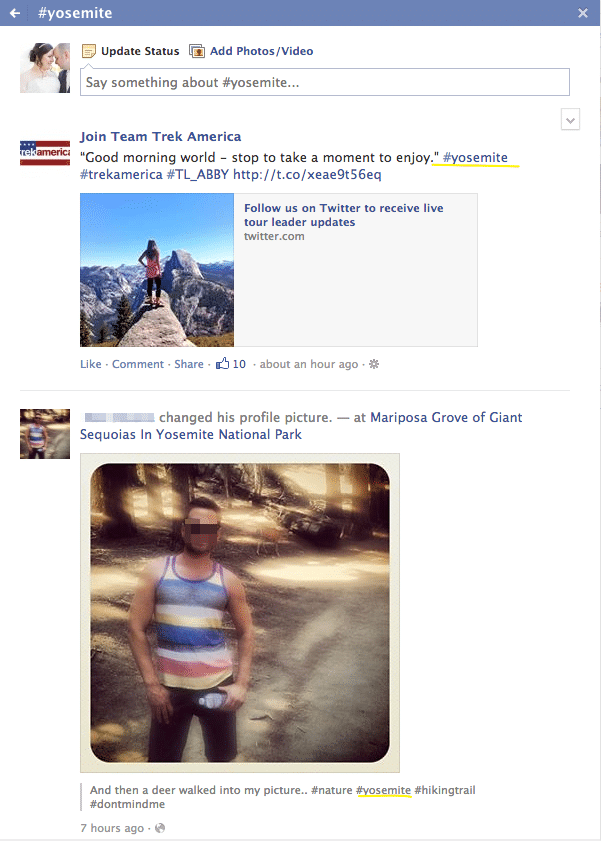As you’ve probably heard, Facebook are now providing support for hashtags. Just like many other social networking platforms, hashtags are becoming clickable so that you can see what other people and pages are posting about on the same topic. Facebook say that this is the first step towards users being able to learn what others are saying about topics and get involved in public conversations, which is similar to how many use Twitter currently.
Hashtags add context to a post and can indicate that it’s part of a larger discussion. E.g. “OMG can’t believe that happened! #RedWedding #GOT”. When the poster’s friends see the post they can click on the hashtags and see what other people are saying about the Red Wedding and the programme itself, Game of Thrones. Another example is a user interested in travelling to Yosemite National Park. A quick search on Facebook for #Yosemite brings up these results:

These are just the first two posts but I might scroll through the feed and find some content that I find interesting and find new pages to like, giving that brand one more person to market to.
From a marketer’s point of view, there are many benefits of the humble hashtags in Facebook. Firstly, it offers more opportunities than ever before to share your brand’s Facebook Page content further. By using hashtags in your posts you can reach a larger audience with a particular interest. For example, #foamrolling refers to the foam roll massage that is a technique used by runners. Users searching for this hashtag are likely to come across your post when it includes #foamrolling. Another example, is the use of #competition, which is used to find users that are likely to want to engage with a competition. By making it easier for users to search by hashtag it’s likely their use will increase so brands, and individuals alike, may find it ever more important to make use of hashtags in posts.
In addition, hashtags could also be used across multiple platforms as part of advertising campaigns. Hashtags on Facebook can also be leveraged to start a conversation with a group; Twitter chats are increasingly common. The ability to write posts from within the hashtag feed make it easy for users to take part in the chat.
Will hashtags make their way into Facebook advertising? At the moment it’s not possible to target people posting about a particularly hashtag but Facebook may decide to roll this out in order to allow advertisers to pinpoint more accurately the users that they want to target. We could see users targeted based on their reactions to live events and topics, and promoted posts cropping up in hashtagged conversations.
So what does this mean I should do?
- Find some hashtags that are relevant to your activity. These could be broad (e.g. #running) or niche (e.g. #foamrolling).
- Consider using hashtags in all your posts and testing which ones deliver the most engagement.
- Use hashtags to increase the reach of your posts.
- If you have a large enough audience and an active social profile, you may wish to create your own hashtag for events or competitions.
What will you use hashtags for? Please share your thoughts in the comments section below.
